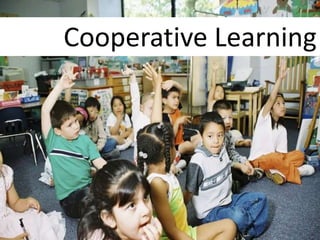
Cooperativelearning
- 2. What is cooperative learning ? Cooperative learning involves students learning from each other in groups. But it is not the group configuration that makes cooperative learning distinctive. The important thing is the way that students and teachers work together.
- 3. In Cooperative learning, students must work in groups to complete tasks collectively. Unlike individual learning, which can be competitive in nature, students learning cooperatively.
- 5. Teachers Role Initially, the teacher carefully designs meaningful tasks that require active participation of each student in the group toward a common end. At the beginning of a cooperative lesson the teacher's role can be defined as a "task setter." As groups work on tasks, the teacher acts as a facilitator/coach moving from group to group to monitor the learning process. The teacher also provides students with on- going feedback and assessment of the group's progress.
- 6. Students Role • Organizer—provides the group with the overall process structure • Recorder—writes down important information (e.g., directions or group work) • Checker—Makes sure that all team members understand the concepts and the team's conclusions. • Questioner—generates questions and involves all students • Assessor—evaluates the progress of each work session • Encourager—models and reinforces appropriate social skills
- 7. Students Role • Summarizer: Restates the team's conclusions or answers. • Spokesperson—represents the group and presents group work to rest of the class • Timekeeper—keeps group on task and on time • Team facilitator—Moderates discussions, keeps the team on schedule, ensures that work is completed by all, and makes sure that all have the opportunity to participate and learn. • Elaborator—Relates the discussion with prior concepts and knowledge. • Research runner—Gets needed materials and is the liaison between teams and between their team and the instructor.
- 8. Types of Cooperative Learning 1. Formal -work together for several weeks toward shared goal 2. Informal -work together in temporary groups toward shared goal 3. Base groups -work together in long term groups
- 9. BASIC ELEMENTS Positive interdependence: Students feel responsible for their own and the group's effort. Face-to-face interaction: Students encourage and support each another; the environment encourages discussion and eye contact. Individual and group accountability: Each student is responsible for doing their part; the group is accountable for meeting its goal. Social Skills: Social skills must be taught for successful cooperative learning to occur. Group processing: Group members analyze their own and the group's success, effectiveness and decide how it can be improved.
- 10. Techniques
- 11. Activity Time! • For this exercise, you will need a few pairs of scissors as students are to read the story, cut it up, put it back together and read it again. This exercise reinforces both the left to right directionality and syntax of English. It also gives students at this low level the much needed opportunity to practice reading the story several times. (Jigsaw activity)
- 12. This reading exercise is followed by a worksheet requiring students to make questions by filling in the question word, either who, what, when or where. Short answers are supplied. After you’ve taken it up, have students practice asking and answering the questions in pairs. You can then have one student read the question from the sheet and the other answer from memory, without looking at the sheet. (Jigsaw activity)
- 13. When can you use it ? Cooperative learning can be used in any class at any level with any subject area. Cooperative learning works well when it is a part of the culture of a classroom, and when students are familiar with working together and know what is expected of them.
- 15. Working TOGETHER achieves greatest learning outcomes. Promotes long term retention and on task behavior Higher reasoning strategies Positive attitudes about learning Increases motivation to learn
- 16. Working TOGETHER achieves quality relationships. Gives feeling of responsibility and willingness to explore Positive relationships, lower absents and dropout numbers Student emotional bond effects behavior
- 17. Working TOGETHER achieves good psychological health. Strengthens relationships Builds social skills Improves reasoning strategies
- 18. Limitations Cooperative learning is constantly changing, there is a possibility that teachers may become confused and lack complete understanding of the method. The fact that cooperative learning is such a dynamic practice means that it can not be used effectively in many situations. Also teachers can get into the habit of relying on cooperative learning as a way to keep students busy. It will consume time. Also peer review and evaluations may not reflect true experiences due to perceived competition among peers. Students might feel pressure.
